Scanning the brain can help diagnose Alzheimer's early
A study reported on Dec. 21 showed that brain scan techniques help identify brain deposits that are linked to Alzheimer's disease in people with mild amnesia.
This finding shows that brain scans, or a similar test, will one day be able to identify people who are about to be Alzheimer's, a disease that causes severe memory loss for nearly 5 million people in the United States. .
Researchers are racing to develop drugs to slow the onset of disease, according to lead researcher Gary Small at the University of California, Los Angeles. If successful, people with mild dementia may be identified and treated early.
Small et al. Performed cognitive testing of 83 people aged 49 to 84 and identified 25 people with Alzheimer's, 28 others with mild cognitive impairment, a condition that sometimes leads to Alzheimer's disease. The rest are healthy.
 (Photo: bcm.edu) Researchers were given a compound called FDDNP . Other previous studies have shown that the chemical used to mark the brain goes into abnormal deposits or protein plaques, which are seen as the criteria for determining Alzheimer's disease. The compound also binds to 'protein' tangles in the brain - another key criterion for determining disease.
(Photo: bcm.edu) Researchers were given a compound called FDDNP . Other previous studies have shown that the chemical used to mark the brain goes into abnormal deposits or protein plaques, which are seen as the criteria for determining Alzheimer's disease. The compound also binds to 'protein' tangles in the brain - another key criterion for determining disease.
Small said, brain scans, if re-evaluated in other studies, could help doctors see the plaque or protein tangle of Alzheimer's disease in living people. Currently, doctors give memory tests to diagnose the disease, but the only way to verify the diagnosis is by autopsy.
People in this study were given a PET scan to analyze the amount of chemical markers in the brain. The research team found that people with severe Alzheimer's disease had a high concentration of markers in the areas of the brain with the most damage.
Small added that some people with slight malfunctioning had scan results that showed them in the early stages of Alzheimer's disease.
The UCLA team performed scans that followed more than 12 people. These people went from normal working memory to mild malfunction and those with severe Alzheimer's, all of whom were noted to be associated with increased markers that corresponded to the severity of the disease - a finding suggests that the disease attacks the brain more and more over time.
Small adds that this method may be available to doctors in the next 3 years if it goes well. But, according to the New England Journal of Medicine , William Thies quoted the Chicago-based Alzheimer's Association as saying that the scan has not been fully tested in humans. Researchers do not know whether this new scan will determine whether the patient is at risk for Alzheimer's. - Thies said - "This scanner has not been able to be used recently."
As Susan Molchan works at the US National Institute of Aging, this new scanning method, and some similar tests, will still be a truly valuable tool for researchers - those is trying to find drugs to treat Alzheimer's disease.
Doctor DANG HAO
- Develop new technology for early detection of brain tumors
- The keyboard is about to disappear?
- Electronic nose helps to diagnose cancer early
- Technology for early detection of brain injury in children
- Use nano sensors to diagnose cancer early
- Sex map on female brain
- New tests help diagnose liver cancer early
- Exotic dog recruitment tactics of the US military
- Early diagnosis device
- Nokia applications have mobile brain scanning capabilities
- Eye reveals brain health (Part 1)
- 'Scanning the brain' to find the right partner
 Green tea cleans teeth better than mouthwash?
Green tea cleans teeth better than mouthwash? Death kiss: This is why you should not let anyone kiss your baby's lips
Death kiss: This is why you should not let anyone kiss your baby's lips What is salmonellosis?
What is salmonellosis? Caution should be exercised when using aloe vera through eating and drinking
Caution should be exercised when using aloe vera through eating and drinking If your hand has this spot, you may have the blood of another species.
If your hand has this spot, you may have the blood of another species.  Dangerous diseases that require vaccination from a young age
Dangerous diseases that require vaccination from a young age  WHO approves first rapid, accurate test for tuberculosis
WHO approves first rapid, accurate test for tuberculosis  'Disease X' outbreak, WHO and many countries take urgent action
'Disease X' outbreak, WHO and many countries take urgent action  Returning from the White City, the expedition team contracted a terrifying disease.
Returning from the White City, the expedition team contracted a terrifying disease.  How did the world's first great settlements mysteriously collapse?
How did the world's first great settlements mysteriously collapse? 